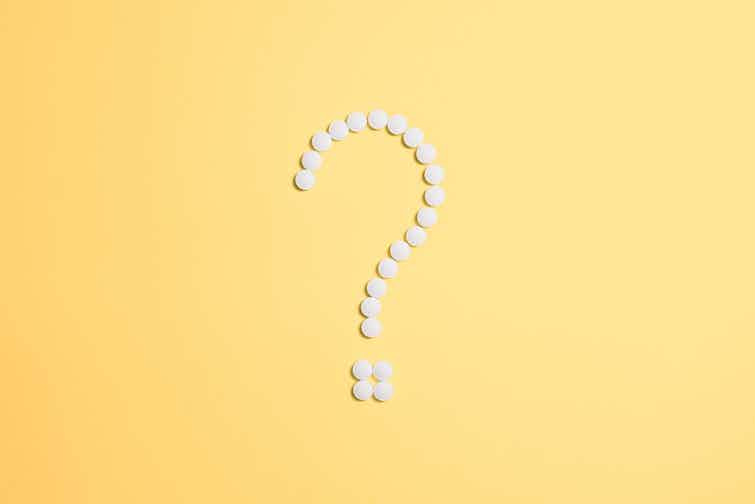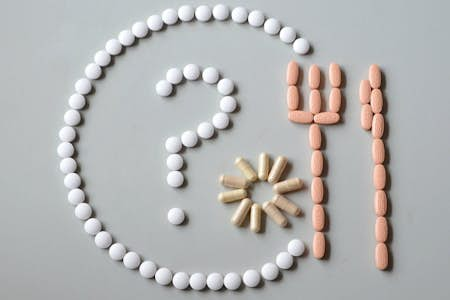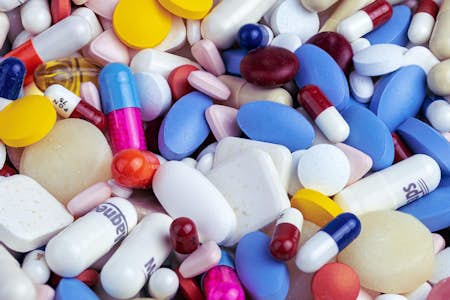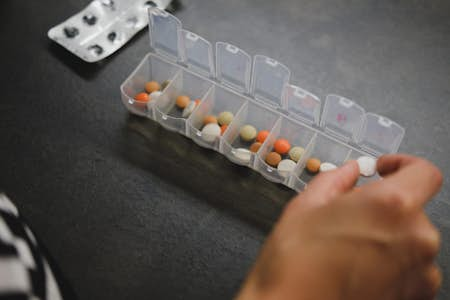In England and Wales, 65% of heart attack patients take beta-blockers like bisoprolol. Bisoprolol is a common option for those with hypertension (high blood pressure), heart failure or angina.
While there are no foods to avoid while taking bisoprolol, it’s crucial to understand any key lifestyle factors that may affect your prescription so you can effectively manage high blood pressure and enjoy a healthy lifestyle.
Whether you're looking for the latest vitamins and supplements, want to stock up on over the counter medication, or are looking for a digital solution for your regular prescription, our providers have you covered. Compare brands below and click on your favourite to shop their best offers now!
Do I need to make any changes to my diet when taking bisoprolol?
One of the best ways to help bisoprolol do its job is to eat a healthy, balanced diet. In particular, avoid a high-salt diet when taking bisoprolol if you have high blood pressure.
There are a few nutrient-rich foods to include in your diet, such as:
- Fruits and vegetables.
- Wholegrains.
- Lean proteins.
- Fat-free dairy products.
You should also think about your potassium levels, as this mineral balances salt levels in your body and naturally lowers blood pressure. Eating potassium-rich foods like bananas can interact with beta-blockers such as bisoprolol. They can also become problematic when consumed excessively alongside ACE inhibitors such as lisinopril, causing your potassium levels to become too high. This may lead to dangerous heart palpitations.
Grapefruit juice affects some statins and cholesterol prescription drugs by increasing the level of the medicine in the blood. If you take bisoprolol, consult your healthcare provider before consuming grapefruit juice to avoid any potential issues.
Are there any lifestyle changes I need to make when taking bisoprolol?
It’s important to look after yourself when taking bisoprolol so that this drug can do its job and effectively manage your blood pressure and heart health. Making small lifestyle changes can also help to manage this condition naturally.
Can I drink alcohol while taking bisoprolol?
Drinking too much alcohol can raise your blood pressure and worsen heart failure, meaning bisoprolol can’t do its job correctly. When taking bisoprolol, stick to 14 units of alcohol a week or less and monitor your alcohol consumption.
Unfortunately, knowing how alcohol and bisoprolol will interact when you first start taking your prescription is impossible. For this reason, most doctors recommend giving up alcohol until you understand exactly how it will affect you.
Alcohol can also exacerbate the side effects of bisoprolol, such as dizziness and changes in pulse or heart rate.
Can I smoke when taking bisoprolol?
You may want to quit smoking when taking bisoprolol, as this can help to naturally bring down your blood pressure. Smoking also makes your blood vessels narrower, restricting blood flow and making it harder for bisoprolol to do its job.
If you can avoid second-hand smoke, this will help, too.
Can I drink caffeinated drinks?
Caffeine can interact with beta-blockers such as bisoprolol, making your prescription less effective. Avoid drinks such as coffee, tea and fizzy drinks to ensure this drug can do its job.
Caffeine may also increase your risk of experiencing uncomfortable bisoprolol side effects, affecting your quality of life while taking this drug.
Should I change my exercise routine while taking bisoprolol?
Regular exercise helps keep your heart and blood vessels healthy, aiding the role of bisoprolol in the body. Even a short daily walk can increase your heart rate and help manage hypertension. However, don't push yourself too much.
If you’re taking bisoprolol, try to avoid stress as much as possible, as stress and anxiety increase blood pressure. Manage your stress levels by spending time with others and switching off after work.
Why do I need to take bisoprolol?
Bisoprolol treats various heart and cardiovascular conditions. These include:
- High blood pressure (hypertension).
- Heart failure.
- Chest pain caused by angina.
- Irregular heartbeats.
- Irregular heart rhythm (arrhythmia).
This medication works on specific receptors located in the body, slowing down your heart rate and making it easier for your heart to pump blood around your body. This can also prevent the future development of heart disease, heart attacks and strokes.
How can I get a prescription for bisoprolol?
You can only get bisoprolol as a prescription from your doctor or healthcare provider, as this medication is not available over the counter. Before starting your medicine, speaking to a doctor is vital to understand any useful drug information or food interactions.
If you can’t take bisoprolol, your doctor may prescribe a different beta-blocker, such as atenolol or propranolol. You may also get your bisoprolol prescription under a brand name, such as Cardicor, Congescor or Ziac.
How will bisoprolol interact with my other medications?
There are various drug interactions with bisoprolol. If you’re already taking medication for high blood pressure, a doctor will not prescribe bisoprolol, as taking multiple medicines to reduce your blood pressure can make it too low. This is also a health concern, as low blood pressure can lead to symptoms such as lightheadedness or blurred vision.
Many meds also reduce blood pressure, even if this is not the main aim of the prescription. For example, some antidepressants and Parkinson's disease medicines can lower blood pressure.
Although bisoprolol is safe to take while breastfeeding or during pregnancy, you should seek medical advice beforehand, as research suggests some types of beta-blockers can pass into breast milk.
Bisoprolol and painkillers
Non-steroidal anti-inflammatory drugs (NSAIDs), like ibuprofen, can reduce blood pressure management. This may stop bisoprolol from doing its job, so check with your healthcare provider before taking these drugs together.
However, there are no known interactions between bisoprolol and paracetamol if you need to take an over-the-counter painkiller.
You should also speak to a doctor before taking any herbal remedies or supplements. For example, calcium carbonate can interfere with the absorption of bisoprolol, reducing its effectiveness.
Will I experience any side effects while taking bisoprolol?
There are a few common side effects of bisoprolol, including:
- Headaches or migraines.
- Dizziness.
- Nausea.
- Sleepiness.
- Cold hands and feet.
- Constipation.
You may experience these side effects when taking bisoprolol for the first time. They tend to be very mild and short-lived, but discussing any concerns with your GP or healthcare provider is essential.
There are some more severe side effects to look out for when taking this medication, such as shortness of breath or swollen ankles. If you or someone you look after is taking bisoprolol, look out for yellowing skin or yellow in the white of the eyes, as these symptoms can indicate liver problems.
Bisoprolol can also cause changes in your blood sugar levels, covering up signs of low blood sugar. However, bisoprolol is less likely to cause side effects than other beta-blockers, as this medication works mainly on the heart, whereas medicines such as propranolol or diuretics affect other parts of the body. This means that patients who take these medications may experience worse side effects than those who take bisoprolol.
Everything you need to know when taking bisoprolol
Bisoprolol is a common beta-blocker that helps to manage medical conditions such as heart failure and hypertension. Making lifestyle and diet changes can help this medication do its job properly - and these factors may reduce your blood pressure naturally, too.
Avoid alcohol, exercise regularly and understand any medication interactions to reduce your blood pressure and improve the effectiveness of bisoprolol.
Image Credit: Anna Shvets at Pexels







